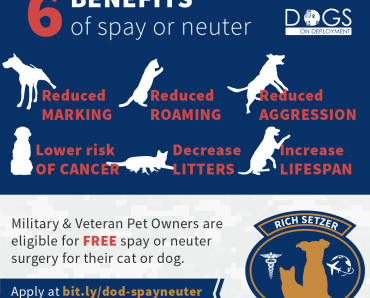By Alisa Johnson, President Dogs on Deployment

A veteran’s dogs whom we worked to help find placement.
Shortly after Dogs on Deployment started gaining steam in recruiting volunteers and military members began hearing about our program for the first time, so did the Veterans’ Affair (VA) Department in Virginia Beach, VA. The first veteran we helped was homeless, car-less, but not dog-less. With two Jack Russell Terriers that meant the world to him, he was unable to enroll in the VA Department’s homeless domicile and job rehabilitation program and care for them. He had to find a place for his dogs to live in order for him to receive help. Without Dogs on Deployment’s, and other organizations, businesses and individuals’ help, he would have had to either give up his dogs, or remain homeless. Thanks to countless supporters, he was able to find temporary care for his dogs so that he could enroll in the VA’s program; getting food, shelter and a chance to start again.
Since then, Dogs on Deployment has helped several other veterans facing the same or similar situation. We are usually contacted by the VA case worker who has one question: How do we proceed to help this veteran? The below information serves as a guideline how a veteran and their pets can be assisted through our program.
Find out the veteran’s situation. Every situation, person and pet is unique, and it is important to understand the veteran’s relationship to their pets, and then determine what the future holds for that veteran in order to give good advice in moving forward.
Can they provide long term care for their pets? Is rehoming a better option? While it may be obvious that a pet owner loves their pets, they may not be in the position to give long term care for their pets. Prolonged homelessness, mental stability, financial future, illness and other life factors contribute to whether or not a person is, or will be, in the best position to give long term care for a pet. If enrollment in the VA or treatment for a condition is anticipated to take an extended period, or a full recovery is not anticipated, permanently rehoming a pet may be a fair consideration. Though hard, there are many rescue groups that would be willing to help a veteran find a permanent and loving home for their pet.

A veteran and his cat.
©Pets for Patriots, Inc.; all rights reserved.
Is short-term fostering a feasible alternative? If a veteran is expected to make a fully recovery in a reasonable amount of time, fostering may be a great alternative to permanently rehoming a pet, as this would give the veteran the ability to receive needed treatment, time to concentrate on recovery, while ensuring peace of mind that their pet is in safe keeping for the time being. Veterans may rely on their friends, family or other relations to ask for aid in helping care for their pets during their treatment. If no one is available, organizations like Dogs on Deployment exist to provide a network of volunteer foster homes prepared to take on a veteran’s pet.
Understand what Dogs on Deployment does. Dogs on Deployment is a networking site; we do not arrange boarding between Pet Owners and DoD Boarders. It is the responsibility of the Pet Owner to contact DoD Boarders in their area and choose one that will be the right fit for their pet. This may be difficult for a veteran who may not have access to or experience with computers or the internet. Because of this, a veteran may need a representative to assist in creating an account and contacting possible homes. Any one whom the veteran gives permission to may act on their behalf; the VA social worker, a friend, family member or even a volunteer. The acting-pet owner may create an account and relay any possible homes to the veteran for discussion of possibilities. There is no guarantee that every Pet Owner will find a DoD Boarder through our network, but using our site proactively will increase the chances of finding the right DoD Boarder.
How to make an account on behalf of a veteran. In order to make an account on behalf of a veteran, visit www.dogsondeployment.org and click on “Create Account.†The registration form requires basic information regarding the veteran’s personal information, pets’ information and service information. Dogs on Deployment requires a form of ID and a DD-214 Honorable Discharge form. Ensure that all information is accurate and provide an email address and/or phone that can readily be accessed by either the acting-pet owner or the veteran. Give an honest best guess for how long boarding may be required and try to anticipate a lengthy boarding period if one may occur. Uploading a photo of the pet will increase chances of finding a suitable DoD Boarder as the photos are shared on our Facebook page.
Contacting and choosing a DoD Boarder. Dogs on Deployment has outlined a detailed guide on how to find and choose a suitable DoD Boarder. Once a DoD Boarder has agree to consider a pet, the veteran should ensure that a contract is completed between them and the DoD Boarder. It is recommended the DoD Boarder be given the ability to contact the VA to make inquires about the veteran, should communication between the veteran and the DoD Boarder cease for any reason. Should the DoD Boarder be unable to provide care for the pet for any reason during boarding, an emergency plan should be made in case such an occasion arise. It is important to find a DoD Boarder that understands the veteran’s situation and is able to be flexible should the need for boarding be extended for any reason.

A veteran whom Dogs on Deployment pledged $300 to help with his dog’s emergency medical treatment. ©Pets for Patriots, Inc.; all rights reserved.
Emergency funds and placement. Should a veteran be absolutely unable to care for their pet, or unable to find an immediate DoD Boarder as needed, Dogs on Deployment provides a Pet Chit Financial Assistance Program to assist. Dogs on Deployment can provide financial aid up to $500 for help with pet care. This money, which is funded solely by donations, can be used towards boarding costs, if a DoD Boarder cannot be found, or even for help with basic pet care: food, veterinarian expenses, vaccinations, transportation or other necessary supplies.
With care and patience, a veteran can be given the special opportunity to not only receive needed treatment or assistance, but also be able to keep their beloved pets. Pets can be essential to helping a person heal physically, mentally and emotionally. Some of these veterans loose everything, and with a little help we can give them the chance to keep something very precious.




